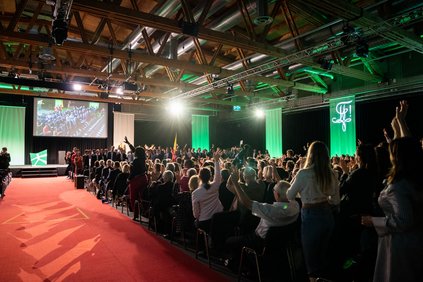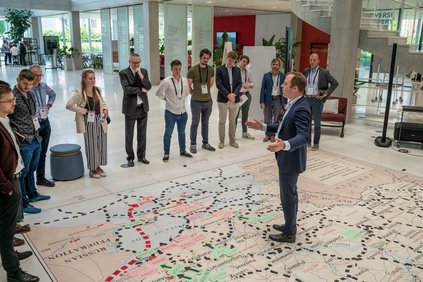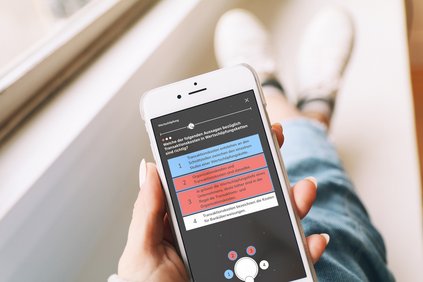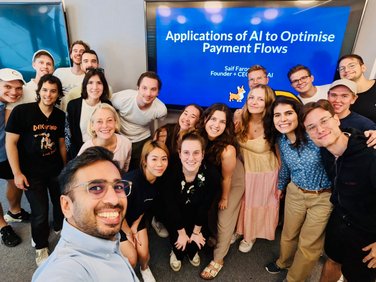Campus - 14.12.2022 - 10:47
HSG lecturers experiment with podcasts
Podcasts are experiencing a never-ending boom. HSG lecturers are also using the audio format in their courses. This may be in addition to specialist literature or even as a creative task for students.
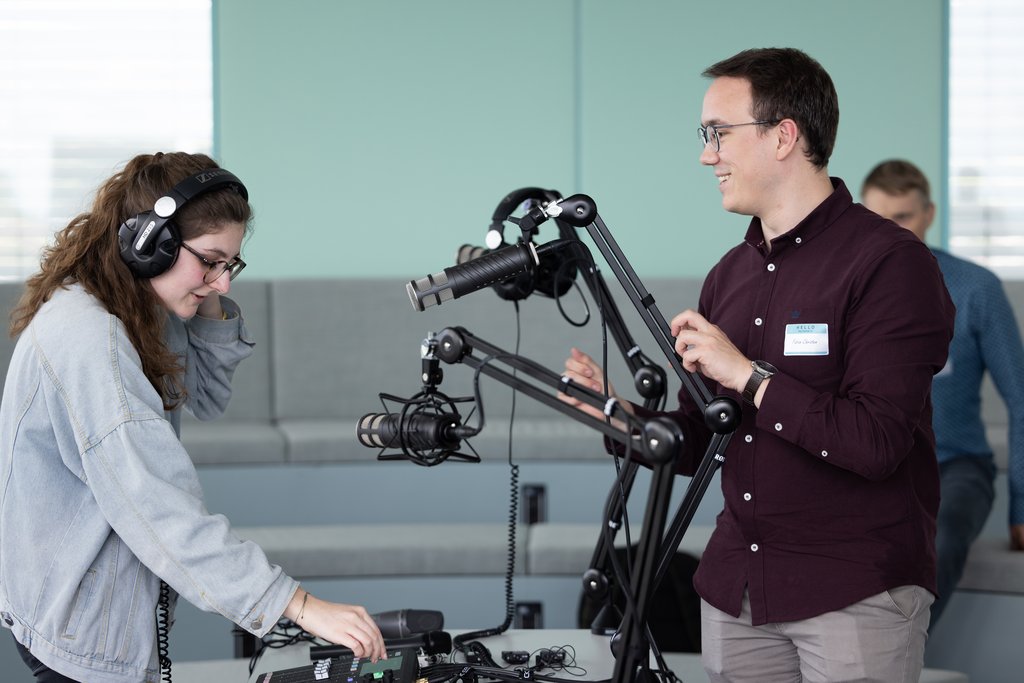
[Translate to English:] Fabia Odermatt vom Media Lab der HSG zeigt Dozierenden am Tag der Lehre 2022 Podcast-Equipment.
2.6 million Swiss people, or 29 percent of the total population, regularly listen to podcasts. According to the representative survey Digimonitor 2022 from the Swiss IGEM (the Swiss Electronic Media Interest Group), the use of these audio formats is particularly widespread among younger people. “Almost all students now listen to podcasts, not only for entertainment but also to acquire specialist knowledge,” says Jörg Metelmann, HSG Titular Professor of Mediating Culture. “As regular teaching staff we should therefore respond to this and experiment with the podcast format.” In his course “Plural Economics. Journeys into Alternative Economic Systems”, Metelmann let students produce podcasts for the first time in the spring semester of 2022.
The students recorded narrative, fictional podcasts to illustrate the functioning of alternative economic systems. For example, they drafted expert interviews, diary entries, radio plays and even a confession. The students made these podcasts available for the course group to listen to before holding a joint discussion. “Creating a narrative and putting it into audible form challenges the students’ imagination,” says Metelmann. For him, it is conceivable that future podcasts might be published with the consent of the students. “This makes the diverse knowledge produced at HSG more easily accessible than it would be through academic texts,” says Metelmann.
HSG opens SQUARE podcast studio
HSG is promoting the use of podcasts in teaching: since March 2022, a fully equipped podcast and video studio has been set up in HSG’s Teaching Innovation Lab (TIL). “We support regular teaching staff and students with the production of podcasts, videos and digital animation,” says Fabia Odermatt, Media Lab Specialist at the TIL. This ranges from advice to recording and production in the HSG studio.
This service was recently used by Ralf Imstepf, HSG Assistant Professor of Fiscal Law. He recorded three podcasts in the media lab alongside Florian Regli, Senior Research Fellow at HSG, which will be used to support a lecture on VAT law in the spring semester of 2023. Imstepf references the flexibility that podcasts allow: “We can use the podcast to pass on information that cannot be covered in the lecture. Students can listen to the podcast at any time.” One challenge for Imstepf was to translate technical language into the spoken word: “Law requires clear and precise language, which can be difficult to provide for podcast beginners like us.”
Fabia Odermatt, who completed a bachelor’s degree in International Affairs at HSG, also mentions this aspect: “Teaching staff need to simplify their language and sharpen up the content for podcast recordings.”
“Podcasts break through the daily study routine”
Klaus Dingwerth, HSG Professor of Political Science, says that podcasts require a new way of researching and preparing knowledge from students. In the 2019 autumn semester of the course “Global Environmental Politics”, he let students choose whether they wanted to record a podcast or write a classic seminar paper. “The students had to interview authors of scientific texts for the podcasts. If you know that you are going to ask the author of a text about its content, you prepare differently than if you just want to quote from that text,” says Dingwerth. He says the students who opted for the podcast option were very motivated. “A podcast can break through the daily study routine that is dominated by seminar papers and presentations – and can therefore ensure a more lasting learning effect,” says Dingwerth, who is planning another podcast course for the spring semester 2023.
Paula Bialski, Associate Professor of Digital Sociology at HSG, has already used podcasts in courses several times – both as supplementary course content and as an examination assignment. In the spring semester of 2021, students under her guidance produced the ten-part podcast “Music in Lockdown”, which explored the impact of the coronavirus pandemic on the music scene through interviews. “This way, students learned to use interview techniques. They also had to develop a research question and stick with it in the production process,” says Bialski.
More articles from the same category
This could also be of interest to you
Discover our special topics


